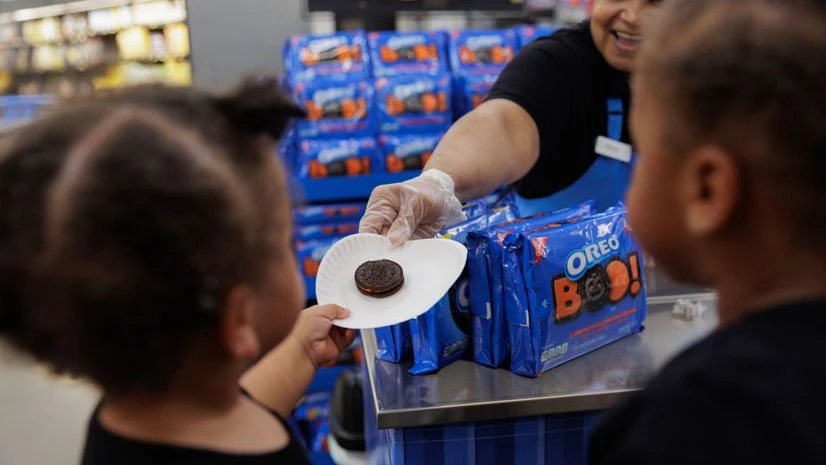By Spencer Soper, Brendan Case and Caelyn Pender
Online ads are delivering less bang for the click these days, so brands are turning to an old brick-and-mortar marketing gimmick: handing out free samples at the local supermarket.
In stores across the US, companies are doling out everything from small-batch nut butter and sanitary wipes to Halloween-themed Oreos. While warehouse clubs like Costco and Sam’s have been offering freebies for years, more retailers are discovering that samples provide something digital marketing can’t: a chance for shoppers to try products before buying them.
After conducting a successful trial, Walmart Inc. recently announced plans to expand samples to more than 1,000 locations. In May, grocery giant Wakefern Food Corp. said it would put freebie vending machines in 95 ShopRite and The Fresh Grocer stores.
Sampling appeals to online upstarts and conglomerates alike. Smaller brands get exposure and a potential new retail partner, while larger established companies can trial new products and iterations of existing ones.
“Free sampling in stores is a great way for brands—which have saturated the marketing opportunities on Facebook and Google—to get more exposure,” says Andrew Lipsman, an analyst at Insider Intelligence.
More From This Section
For years, companies large and small used online ads to help target their products at specific demographics. But doing so became less effective in 2021, when Apple Inc. began letting iPhone users block brands from tracking their online behavior. Meanwhile, several states including California enacted digital privacy legislation that made it even harder for companies to access consumer data. The upshot: It’s now much more expensive to find new customers through social media channels and keyword search ads. Online merchants lost an average of $29 on each purchase from a new customer in 2022, more than triple the cost eight years earlier, according to a study by SimplicityDX, a software firm that helps brands with social media marketing campaigns.
Los Angeles entrepreneur Michelle Razavi was eager to boost sales of Elavi, a low-sugar nut butter she launched three years ago as an online brand. Ads on Instagram, Amazon and other sites had become pricier and less effective amid growing competition for eyeballs. So Razavi cold-called a Costco Wholesale Corp. executive to ask about giving out samples in stores.
A few months later, she and co-founder Nikki Elliott were standing on the precious real estate Costco shoppers pass on the way to the checkout, handing out dollops of cashew butter atop banana slices. Over four weekends, they gave out about $8,000 worth of product and exposed their brand to thousands of shoppers at Costco warehouses in Los Angeles. Comparable sales and exposure would have cost them about $80,000 via Instagram ads and social media influencer campaigns, they estimate.
Razavi says about 3% of Costco shoppers who tried the product made a purchase, much higher than the 1% who purchase something after seeing a social media campaign. “In person, you see people’s reaction and can adjust your approach,” she says. “Online is just marketing to a dark screen.” Now she and her partner are negotiating to start selling their nut butter in dozens of Costco stores.
Mondelez International Inc. is using free samples to raise awareness about new and seasonal products such as those Halloween-themed Oreos. The snack maker has also handed out goodie bags to curbside-pickup customers, typically with a QR code they can use to add the items to their next order. The company isn’t abandoning online advertising but increasingly will use it to point shoppers to recipes with its products or an array of snacks for, say, a college football watch party.
“We can’t just have a sampling table at Walmart and expect it to sell,” says Steve McGowan, head of shopper activation and strategic partnerships at Mondelez. “We have to have an omnichannel approach. We need digital media to alert people that this is in the store and potentially a digital offer to get them over the hump to buy the full package.”
A key player in the freebies game is Chicago-based Freeosk, which sells automated sampling kiosks that dispense a broad range of household names, including Sour Patch Kids, All detergent and Famous Amos cookies. Freeosk works with leading grocery stores such as Safeway and Albertsons and has kiosks in more than 1,400 locations across the country.
Shoppers select samples via a smartphone app, which also collects useful customer data. If they like a specific product, they can fill their cart with merchandise displayed around the machine. Freeosk says shoppers new to a given brand generate 70% of kiosk purchases. Digital brands are starting to understand the value of sampling because more than 80% of retail spending happens at physical stores, “an audience larger than their online audience,” Chief Executive Officer Matt Eichorn says.
One convert is Dude Products, the Chicago-based maker of disposable Dude Wipes. Founder Sean Riley says he’s using Freeosk dispensing machines in Sam’s Club stores for his individually wrapped wipes and, in an effort to disrupt the toilet paper industry, is paying people to hand out bigger packs of flushable wipes at Target. He says the freebies typically boost sales by 20%.
“We’re in the habit change business, and the best way to change someone’s habit is to give them a chance to try your product,” Riley says. “Some people build a business online and get stuck in a digital mindset with their marketing. Giving out samples helps you grow beyond.”

)
